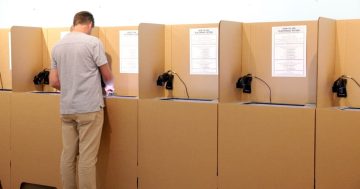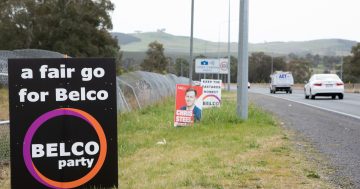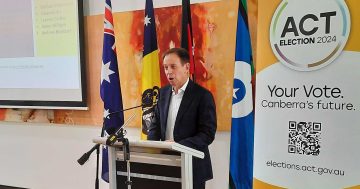
“Young people are disproportionately affected by the decisions we make in the Assembly,” Johnathan Davis MLA said. Photo: Thomas Lucraft.
The ACT Greens have scheduled a debate in the Legislative Assembly this week into whether 16 and 17-year-olds in Canberra should be able to voluntarily vote in next year’s Territory election, despite a previous inquiry advising against it.
The Greens have long supported extending the right to vote to 16 and 17-year-olds and argue that young people should have more say in local decisions that impact them.
“Young people are disproportionately affected by the decisions we make in the Assembly. They are inheriting a planet, economy and living conditions in urgent need of repair, and they deserve a say,” ACT Greens spokesperson on young people Johnathan Davis said.
“The Canberra Liberals have expressed no interest in this reform, but we don’t know which way the local Labor MLAs will vote. It’s time to find out.”
When the Electoral Amendment Bill was first presented to the Assembly by the Greens in December 2021, it was met with opposition from both parties, but the Greens have now prepared amendments based on community feedback and say – ahead of the 2024 election – now is the time to empower young voters.
“In 1901, the right to vote applied only to men aged 21 and over, excluding First Nations people. As we have many times since then, it’s again time to expand the right to vote to align with community expectations, and the neuroscience that demonstrates 16 and 17-year-olds have the maturity to vote,” ACT Greens spokesperson on democracy Andrew Braddock said.
The Justice and Community Safety Committee inquired into the bill in 2021 and received 18 submissions from individuals, community organisations and political parties.
“While the committee does not support the Electoral Amendment Bill 2021, it fully recognises the valuable contribution that young people make to the Canberra community,” it concluded.
In its submission, ACT Labor said that “consideration should be given to allowing people 16 and 17 years of age to vote”, but several need to be considered.
Labor expressed concerns about introducing voluntary voting for 16 and 17-year-olds and ensuring consistent communication.
“This may inadvertently lead to a cohort of young ACT voters who ‘miss the memo’ in future elections,” its submission said.
It said there could be a “significant communication challenge” to avoid mixed messaging due to a possible inconsistency between Federal and Territory voting age.
Labor also highlighted the potential challenges in politically engaging younger voters.
“As the electoral commission has highlighted … considerable funding and support would be necessary to support the increased role of the Commission in not only managing the enrolment and roll for 16 and 17-year-olds but also in engaging and communicating with them in respect of their obligations,” it said.
The Canberra Liberals were resoundingly against the bill, arguing that 18 is still the appropriate age for all civic responsibilities and that while it is important to hear the views of young people on the issues that affect them, extending the franchise was not the best way to do this.
“If we take the argument advanced by many of this proposal’s proponents to its fullest extent, it would permit toddlers who are the beneficiary of the government’s childcare reforms a vote. While 16 and 17-year-olds are naturally more politically engaged than toddlers, the fact remains the acts of taxation and government benefits alone are evidently not considered adequate for enfranchisement,” its submission said.
The Liberals argued that the bill was simply a “cheap vote-grabbing exercise” by the Greens.
“This bill is a poorly masked attempt by the Greens to increase their vote in ACT elections. If you are changing the law based on trying to increase or decrease a vote share, that is a bad motivator for change.”
The inquiry recommended that the Assembly not pass the Electoral Amendment Bill but explore other ways to further engage young people in the democratic process.
However, in response to community feedback, the Greens have prepared amendments to the bill that will allow new voters to receive an educational warning notice if they appear to fail to vote at their first election, maintaining the compulsory nature of voting while providing a more effective response than an automatic fine.
“We’ve been working through every barrier raised with us about this reform to keep the focus on enhancing our local democracy,” Mr Braddock said.
“Our legislation retains the principle of compulsory voting, but we will also ensure that any new voter who appears to not vote will receive a more effective educational response rather than an automatic fine.”





















